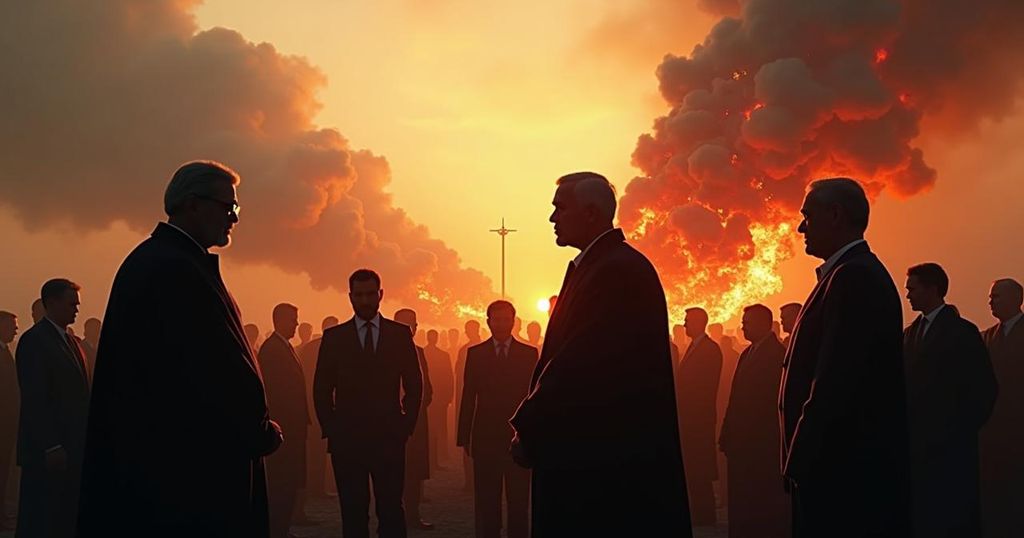Iran’s Dilemma in Response to Hezbollah’s Leadership Loss amid Israeli Strikes
Iran is navigating a complex geopolitical landscape following Israeli airstrikes that reportedly killed Hezbollah leader Hassan Nasrallah. Supreme Leader Ayatollah Khamenei’s response indicates solidarity with Hezbollah, yet experts highlight Iran’s limited options for retaliation. With regional balances shifting and previous aggressive responses failing to deter Israeli actions, Iran faces decisions that could either exacerbate conflict or promote a more defensive strategy to safeguard its interests in the Middle East.
Iran’s Supreme Leader Ayatollah Ali Khamenei has expressed his country’s solidarity with Hezbollah following Israeli airstrikes that reportedly killed the group’s leader, Hassan Nasrallah. Iran faces significant challenges in determining its course of action in response to this precarious situation, as highlighted by experts from Newsweek. The Israeli Defense Forces (IDF) stated that on a recent Friday, they carried out an airstrike in Dahiyeh, south of Beirut, which allegedly resulted in the elimination of Nasrallah. Following the IDF’s assertions, Hezbollah confirmed the death of Nasrallah, a pivotal figure in the Axis of Resistance, crucial for projecting Iranian influence in the Middle East. Khamenei did not directly mention Nasrallah but affirmed, “all the Resistance forces in the region support and stand alongside Hezbollah.” Additionally, Iranian reports confirmed that Brigadier General Abbas Nilforooshan of the Islamic Revolutionary Guard Corps was also killed in the airstrikes targeting Beirut. Meanwhile, Khamenei is reportedly in a secure location within Iran. In the aftermath of Hamas’s attack on Israel on October 7, 2023, Nasrallah’s commitment to intensifying rocket attacks on northern Israel forced evacuations in the region. Hamidreza Azizi, a research fellow at the German Institute for International and Security Affairs (SWP), stated that Iran’s strategic options are severely constrained due to the recent developments, especially in light of previous vows to retaliate for attacks on its interests. Azizi articulated that the premeditated approach by Iran to craft a decisive response that would deter Israeli aggression has become untenable following the demise of Nasrallah. As Azizi elaborated, “the dilemma was for Iran any move beyond that could trigger war, ” indicating that Tehran faces a precarious balance between the desire for retribution and the risk of escalating conflict. Should Iran elect to enter a conflict, it would likely provoke a formidable Israeli response. Conversely, the option to bide time for international mediation appears fraught with uncertainty, as no cessation of hostilities is apparent. Yet, Iran may consider leveraging its network of regional allies, including the Houthis in Yemen and various militias in Syria. However, Azizi cautioned against this, noting an evident lack of command within these factions post-Nasrallah’s death. Iran is thus presented with two unfavorable choices, both laden with ramifications for regional stability. Under Nasrallah’s leadership, Hezbollah evolved from an offshoot of the Shiite Amal movement into a formidable adversary for Israel, amassing significant military capabilities. Furthermore, as civil conflict engulfed Syria, Hezbollah’s engagement in defense of President Bashar al-Assad further solidified its status as an Iranian proxy within a larger network that encompasses Hamas and factions in Iraq. Former Israeli intelligence officer Avi Melamed remarked that Iran may refrain from escalating tensions further, suggesting a possible withdrawal from assertive deterrence strategies in favor of self-preservation. The impact of the recent airstrikes is anticipated to resonate within Syria, where Hezbollah’s presence has been instrumental in supporting the Assad regime. Melamed commented, “Assad’s position could become increasingly vulnerable to rebel factions,” potentially prompting a shift in Syria’s alliances and decreasing Iranian influence within the region.
The context of this discussion revolves around the ongoing geopolitical tensions in the Middle East, particularly following recent military actions by Israel against Hezbollah and Hamas. These developments have significant implications for Iran, a key player in regional conflicts through its support for various proxy groups. The Iranian regime faces a critical juncture following the reported deaths of influential leaders, compelling a reassessment of its military and political strategies. This situation encapsulates the larger conflict dynamics influencing Iran’s relationships and military involvements throughout the Middle East, especially in Syria and Lebanon, where Iranian interests and alliances have been deeply entrenched for decades, often resulting in direct confrontations with Israeli forces.
In conclusion, Iran’s strategic positioning following the deaths of key figures such as Hassan Nasrallah presents the regime with difficult choices. With options that could either escalate conflict or lead to passive engagement, Iran’s response will significantly shape the future dynamics of the region. As experts point out, the delicate balance of power is precarious, with potential ramifications not only for Iran and its proxies but also for Israeli security and regional alliances, particularly concerning the Syrian regime under Assad.
Original Source: www.newsweek.com




Post Comment